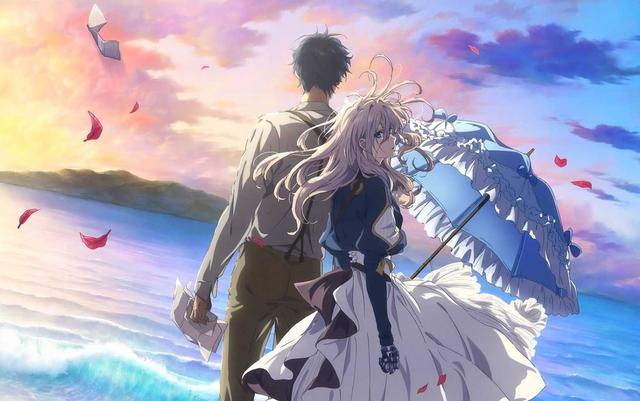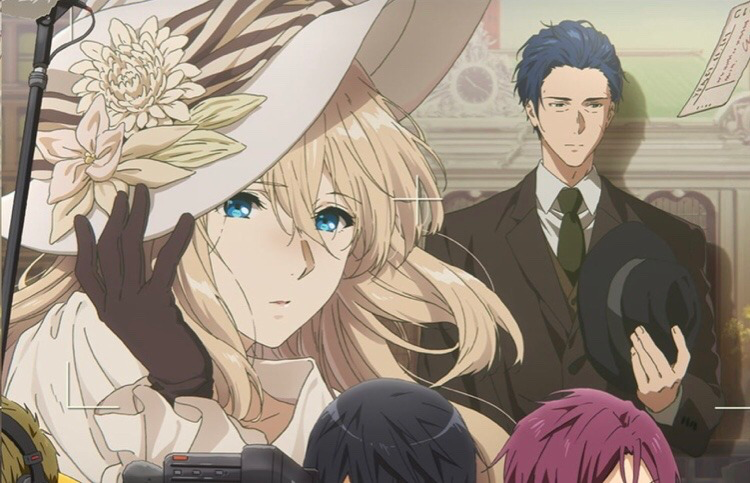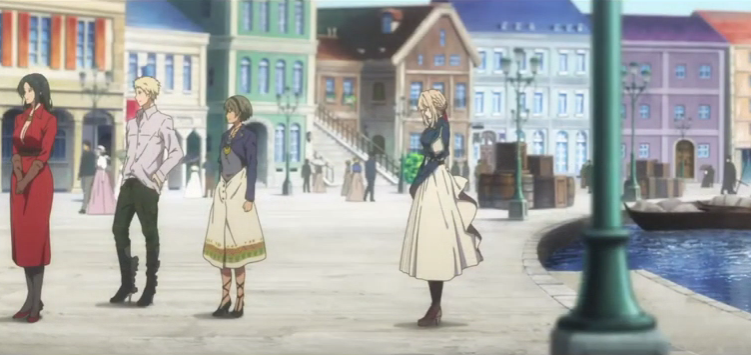Violet Evergarden: The Movie
June 16, 2022 · 0 comments
By Jeannette Ng.

Violet Evergarden: The Movie is a film about second chances, piecing oneself together after tragedy and allowing oneself the luxury of love despite the overwhelming guilt of survival. The very real tragedy of the arson attack on Kyoto Animation’s studio haunts the film. It is one of the reasons for the film’s delay and it is thus impossible not to see the shadow of it in certain lines, such as one about how a simple celebration has now become a memorial for the dead. That the film exists at all is something of a miracle.
The frame story concerns Daisy, the grand-daughter of Ann Magnolia, discovering the letters that Violet had written on the behalf of Clara Magnolia in an episode of the original TV series. For fifty years, letters have arrived every birthday for Ann from her dead mother. Now, Ann herself has passed away and Daisy is curious about that seemingly bygone world of letters. She lingers in the conservatory where Violet had typed up those letters and travels to Leiden, finding a museum where the CH Postal Company used to be.
Superficially, this framing narrative acts as exposition for an audience who has been following the series, explaining the job of the Auto Memory Dolls, but it also allows us to see Violet’s legacy. Ann’s bookending of Violet’s story stresses her literary afterlife and the way that her letters continue to inspire, encouraging others to put their true feelings to paper. It acts as something of a counterpoint to a romantic reunion, showing how Violet’s story isn’t confined solely to her attachment to her beloved Major.
The other story element concerns the terminally ill Yurith enlisting the help of Violet to write letters for his family to remember him by. Much as with the series, this provides parallels to the main characters and underline the themes they are experiencing. Yurith’s protectiveness and jealousy for his younger sibling gives Violet insight into the uncomfortable relationship between the Bougainvillea brothers. It is also with Yurith that Violet learns to recognise and reject pity.

Gilbert Bougainvillea has always been a character very much defined by his absence. Violet returns time and again to her memories of him, every one of them heavy with the horrors of war. His piercing green eyes are echoed in the brooch Violet wears at her throat. It is the lack of his orders that drives her to grow and pushes her to discover herself. It is for want of him that she embarks on her quest to understand love, to understand his dying words.
If he were to come back back, it would feel almost as if Violet were regressing. And in some ways, she does. Violet is again stubborn, single-minded in her need of him and obsessively loyal. Something of the military posture sneaks back into her body language and her choice of words. But she is also not the Violet of long ago. She understands her own emotions far better now and she is far, far more raw in the way she expresses them.
The film is as much about Gilbert as Violet, if not more so. Unlike in the book versions of these stories, Gilbert’s absence is not about giving Violet space to grow without him. He is not orchestrating her growth like a benevolent mastermind. Instead, we see him here as a traumatised man trying to repair an island village that has lost an entire generation to the war. We step outside of Violet’s absolute adoration of him and confront the Gilbert who took a child and ruthlessly used her as a weapon. Violet may have seen him as a protector, but Gilbert knows himself to be a monster and unworthy of her loyalty. He is afraid of the memories that her presence would bring back, overburdened as he is with guilt. Tangled up within him is also a rejection of his father’s legacy and the expectations of his own name.

The animation in the film is startlingly beautiful, full of sweeping vistas and intimate close-ups. Eyes brim with emotion, hands stutter and mouths twist with unspoken words. The weather remains sympathetic as always and rain weeps down with the characters whilst the sea roils restless. The masterful use of chiaroscuro that characterised the series continues in the film, with pitch black scenes illuminated with single sources of brilliant, swimming light.
There is a neatness that makes the film feel final, even as there is still so much unsaid. A handful of familiar faces from the series, like Oscar Webster and Irma the opera singer, are fleetingly revisited. Erika finally realises her dream of becoming a playwright and stages her first production. Benedict asks to become Vice President and is told he needs to first learn accountancy. Iris tempers her ambition with empathy. They each feel alive beyond the margins of the story being told.
Time continues to march forward in the world of Telsis, but instead of hope and rebirth at the end of a devastating war, time brings uncertainty and change. The radio tower is complete, and for all that Iris may loathe the increasingly ubiquitous telephone, the age of the Auto Memory Dolls is coming to an end. The atmosphere is bittersweet and a little mournful as the film confronts change and loss and clinging to the things that matter to us the most. Time is precious and finite and, above all, the film urges us to treasure what time we have with those we love. To find the words to tell them how we truly feel.
Jeannette Ng is the author of Under the Pendulum Sun. Violet Evergarden: The Movie is released in the UK by Anime Limited.
Leave a Reply